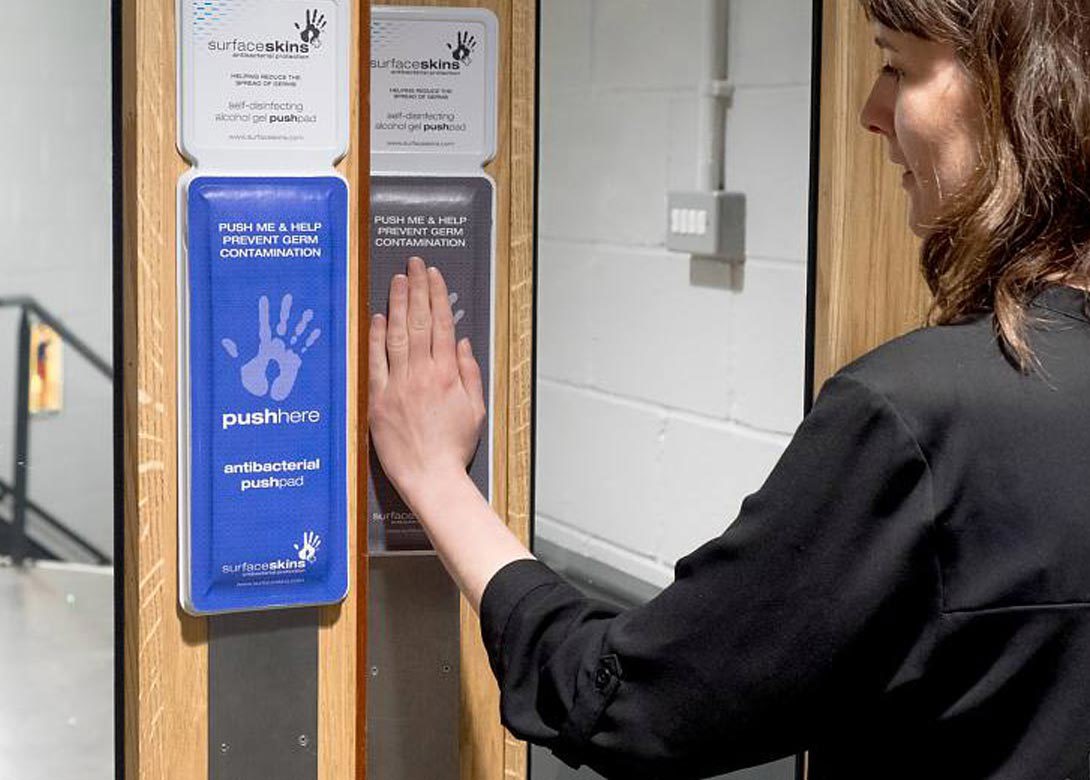
Leeds-based Surfaceskins Ltd needed a solution to replace existing fixing methods used in its manufacturing processes, so called in the tesa® team for advice.
Surfaceskins design self-disinfecting door push pads and pull handles to eliminate the risks of cross contamination, reducing the spread and transmission of germs in medical environments, public restaurants and toilets, schools and other public areas.
Hand washing and gel dispensers clean hands, but as soon as you touch a door you risk becoming contaminated from a previous door user. Surfaceskins are not designed to clean hands, but are engineered to kill deposited germs and bacteria in the vital seconds between one user and the next passing through the door, thus helping prevent the spread of some of the germs and bacteria associated with healthcare associated infections (HAI's).
An initial assessment was carried out by Nigel Jarram, tesa sales area manager and Mark Hill, BDK sales manager, who tesa involved in the process for die cutting suggestions and healthcare expertise.
The tesa team investigated the current processes involved in fixing the pushpads and pull handles to the doors and found that were not effective in providing the high standard of hygiene required. In addition, Surfaceskins had previously been securing the cassettes to the door with a combination of double-sided tape and mechanical fixings, which took longer to install that simply using a suitable tape.
The current use of mechanical fixings was leaving holes in the doors and causing damage when removed. The solution therefore needed to be an adhesive tape that would cause no damage, with the adhesive being removed using a suitable cleaner.
tesa 4965 was identified as a solution for daily use. The transparent double-sided self-adhesive tape consists of a PET backing and a modified acrylic adhesive and is suitable for most demanding applications such as heavy stress, high temperatures or critical substrates. tesa 4965 offered the high bond strength required and the correct thickness to ensure the cassette sat flush with the door.
Following tesa’s assessment, it was found that due to the strength of tesa 4965, the whole area of the cassette did not require tape, only tape to cover the surface area was needed. tesa 4965 was produced in die cut form to tailor to the required size for each cassette, ensuring that Surfaceskins could apply the tape quickly and effectively, speeding up the manufacturing process.
“With die cuts provided by BDK, Surfaceskins can easily apply the tape to the rear of the cassette, reducing installation time and ensuring a clean process. The bonding strength of tesa 4965 is essential as the daily removal and installation of a new gel pad would be problematic. It also has to be reasonably tamper-proof as the units will be installed in public places, like schools,” commented Nigel Jarram, leader of the tesa team.
“We required a product that would be durable and effective for long periods of time, whilst withstanding regular wear and tear – tesa® 4965 provided just that. Using tesa® 4965 die cut strips reduces the application time in half and provides the high strength bonding that we require at a reduced cost. Our customers can be reassured that the cassettes will remain in place for a long period of time and will not need renewing at shorter intervals,” says Brian Waligora, CEO of Surfaceskins.

Having spent a decade in the fastener industry experiencing every facet – from steel mills, fastener manufacturers, wholesalers, distributors, as well as machinery builders and plating + coating companies, Claire has developed an in-depth knowledge of all things fasteners.
Alongside visiting numerous companies, exhibitions and conferences around the world, Claire has also interviewed high profile figures – focusing on key topics impacting the sector and making sure readers stay up to date with the latest developments within the industry.





